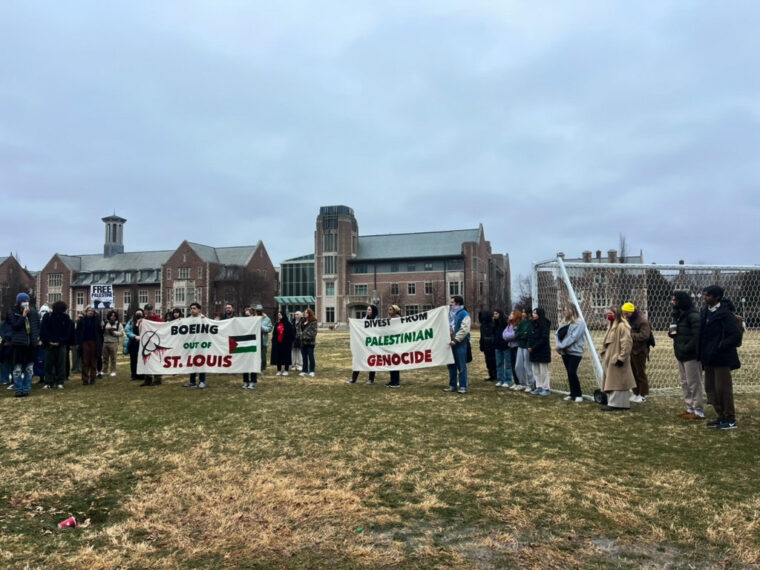News
Protesters call for cease-fire, divestment from Boeing

Protesters gather on Mudd Field as part of a global strike (Bri Nitsberg | Student Life).
About 55 community members protested Washington University’s investments in Boeing on Mudd Field, and urged the St. Louis County Council to call for a cease-fire to the Israel-Hamas war, Jan. 23.
The protest was part of a global strike week, Jan. 21-28, asking people to boycott companies that invest in Israel and to strike from work and classes.
Bisan Owda, a Palestinian journalist reporting out of Gaza on the ongoing conflict, called for the global strike on her Instagram account. She asked her followers to deploy strikes as a method for demanding “an immediate and permanent ceasefire” in Gaza.
Resist WashU, a direct action based collective on campus, is encouraging WashU community members to participate in the strike.
Among WashU protesters’ specific demands are for the University to suspend Boeing’s recruitment events, which one speaker said makes WashU “a recruiting ground for the military industrial complex,” and to divest from the company.
After several students delivered speeches on Mudd Field calling for the University to take action against Israel, protesters took the Metro or drove to a STL County Council meeting to demand the Council pass a resolution calling for a cease-fire.
The St. Louis Board of Alderman already supported a resolution calling for a cease-fire in the Israel-Hamas war, Jan. 12.
WashU students joined several dozen other individuals in calling for a ceasefire between Israel and Hamas at the St. Louis County Council meeting, according to KSDK.com.
Senior Dvora Redlich attended the campus protest and subsequent demonstration at the Council meeting. She said that activists are pushing local governmental bodies to pass ceasefire resolutions to put pressure on the federal government to do the same.
Redlich said she believes this activism is important because it ensures that more people gain an awareness of Israel’s existence as an “apartheid state.”
“When counties and cities pass ceasefire resolutions, it is a step in making sure tax payers are not going to keep paying for this genocide,” she said.
Major international human rights organizations, including Amnesty International and Human Rights Watch, have categorized Israeli policies as apartheid. According to the Associated Press, these groups are joined by an increasing number of retired Israeli military officials who are endorsing the idea that Israel is engaging in apartheid practices.
Other organizations, including the Anti Defamation League, have argued that Israel is not engaging in apartheid practices and that many of the country’s policies being viewed as parts of apartheid are “justified by security considerations.”
The term “genocide” is also being disputed internationally. Certain bodies, including the South African government, have deemed Israel’s military actions as genocidal, while other bodies, including the American State Department have said Israel is not committing genocide.
Junior Eman Teshome, who attended the protest on Mudd Field, said she thinks the demonstration helps express to the University that student support for Palestinians is not a fleeting cause on campus.
“This isn’t a trend that will dry out,” Teshome said.
Nour Ziada, a Palestinian graduate student in Sam Fox, said that the University should stop supporting study abroad opportunities to Israel and end their financial support to the state.
A senior who asked to stay anonymous for safety concerns as a hijabi student, said that people should be calling for a ceasefire, regardless of their stance on the conflict, to end the killing of Palestinians and Israeli hostages.
“You just have to be human to see everything that is happening over there and demand a cease-fire,” she said.
The Council meeting ended early due to the pro-Palestinian protests, and students plan to continue attending Council meetings weekly to demand a cease-fire resolution.
